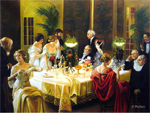
To the Lighthouse
"For
that reason, knowing what was before them--love and ambition and being
wretched
alone in
dreary places--she had often the feeling, Why must they
grow up and
lose it all? And then
she said to
herself, brandishing her
sword at life, Nonsense.
They will be
perfectly
happy. And here
she was, she reflected, feeling life
rather sinister . . ." (60).
Points of Reflection
"The Window"
- through free indirect discourse, the narrative reveals quickly that Mr. Ramsay believes himself dedicated to what is true and factual (4). Does the rest of "The Window" support Mr. Ramsay's assertion, or interrogate it?
- Mrs. Ramsay concludes that her critical, opinionated children create differences for the sake of argumentation "when people, heaven knows, were different enough without that" (8). Does Mrs. Ramsay successfully do the opposite--does she ignore differences and, whenever possible, try to find common ground among those in her personal circle?
- consider Mrs. Ramsay's reflections on marriage, including those concerning Mr. Carmichael (10), the possible union of William Bankes and Lily Briscoe (26, 71, 104), the lovers Minta Doyle and Paul Rayley (49, 55-57, 75-78, 100), and her husband and herself (60, 122, etc.). Why does Mrs. Ramsay consistently identify marriage as the salve for life's ills?
- consider Mrs. Ramsay's occasional thoughts about and encounters with the Arts/ Does she appreciate the Arts?
- examine the various encounters between the following pairs: Mr. Bankes and Lily Briscoe (21-24, 45-48), Lily Briscoe and Mrs. Ramsay (90-93), and Mr. and Mrs. Ramsay (30-40, 65-71, 117-24)? Which of these exchanges rest heavily on spoken words, and which rely more heavily on assumptions, intimations, and non-verbal forms of communication?
- many of those who know Mrs. Ramsay wonder "What was there behind it--her beauty and splendor?" (28). Does "The Window" reveal what lies behind Mr. Ramsay's constitutional reserve and simplicity (29)?
- Mr. Ramsay angrily, if silently, accuses his wife of "telling lies" whenever she gives her children hope (31). Is his a just criticism? Does Mrs. Ramsay consistently lie to others and herself, or is she more in touch with truth/reality than is her husband?
- why does Lily paint? What does she hope to achieve?
- what array of roles and functions does the ocean serve across this novel?
- do the novel’s female characters appreciate their male counterparts more than they deprecate them? Do they value men more than they value their own sex?
- what attitude towards religion and God begins to emerge across “The Window” as we run into various characters’ thoughts (direct and indirect) on the subject?

The End of Dinner (1913)
Jules Alexandre Grun
Dr. Paul Marchbanks
pmarchba@calpoly.edu
![]()
